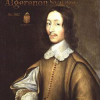Algernon Sidney

Algernon Sidney
Algernon Sidney or Sydneywas an English politician and member of the Long Parliament. A republican political theorist, colonel, and commissioner of the trial of King Charles I of England, he opposed the king's execution. Sidney was later charged with plotting against Charles II, in part based on his work, Discourses Concerning Government, used by the prosecution as a witness at his trial. He was executed for treason. After his death, Sidney was revered as a "Whig patriot–hero and martyr"...
NationalityEnglish
ProfessionPolitician
Date of Birth14 January 1653
Laws and constitutions ought to be weighed... to constitute that which is most conducing to the establishment of justice and liberty.
Many things are unknown to the wisest, and the best men can never wholly divest themselves of passions and affections... nothing can or ought to be permanent but that which is perfect.
There may be a hundred thousand men in an army, who are all equally free; but they only are naturally most fit to be commanders or leaders, who most excel in the virtues required for the right performance of those offices.
Liars need to have good memories.
That which is not just, is not Law; and that which is not Law, ought not to be obeyed.
Everyone sees they cannot well live asunder, nor many together, without some rule to which all must submit.
If the public safety be provided, liberty and propriety secured, justice administered, virtue encouraged, vice suppressed, and the true interest of the nation advanced, the ends of government are accomplished . . .
If his Majesty is resolved to have my head, he may make a whistle of my arse if he pleases.
Swords were given to men, that none might be Slaves, but such as know not how to use them.
[A]ll popular and well-mixed governments [republics] . . . are ever established by wise and good men, and can never be upheld otherwise than by virtue: The worst men always conspiring against them, they must fall, if the best have not power to preserve them. . . . [and] unless they be preserved in a great measure free from vices . . . .
The only ends for which governments are constituted, and obedience rendered to them, are the obtaining of and protection; and they who cannot provide for both give the people a right of taking such ways as best please themselves, in order to their own safety.
Nay, all laws must fall, human societies that subsist by them be dissolved, and all innocent persons be exposed to the violence of the most wicked, if men might not justly defend themselves against injustice by their own natural right, when the ways prescribed by publick authority cannot be taken.
Machiavel, discoursing on these matters, finds virtue to be so essentially necessary to the establishment and preservation of liberty, that he thinks it impossible for a corrupted people to set up a good government, or for a tyranny to be introduced if they be virtuous; and makes this conclusion, 'That where the matter (that is, the body of the people) is not corrupted, tumults and disorders do not hurt; and where it is corrupted, good laws do no good:' which being confirmed by reason and experience, I think no wise man has ever contradicted him.
[I]f vice and corruption prevail, liberty cannot subsist; but if virtue have the advantage, arbitrary power cannot be established.